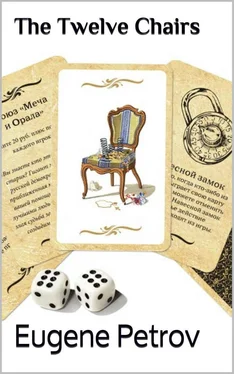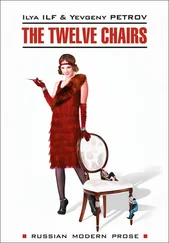Eugene Petrov - The Twelve Chairs
Здесь есть возможность читать онлайн «Eugene Petrov - The Twelve Chairs» весь текст электронной книги совершенно бесплатно (целиком полную версию без сокращений). В некоторых случаях можно слушать аудио, скачать через торрент в формате fb2 и присутствует краткое содержание. Год выпуска: 2013, Жанр: Юмористическая проза, на английском языке. Описание произведения, (предисловие) а так же отзывы посетителей доступны на портале библиотеки ЛибКат.
- Название:The Twelve Chairs
- Автор:
- Жанр:
- Год:2013
- ISBN:нет данных
- Рейтинг книги:5 / 5. Голосов: 1
-
Избранное:Добавить в избранное
- Отзывы:
-
Ваша оценка:
- 100
- 1
- 2
- 3
- 4
- 5
The Twelve Chairs: краткое содержание, описание и аннотация
Предлагаем к чтению аннотацию, описание, краткое содержание или предисловие (зависит от того, что написал сам автор книги «The Twelve Chairs»). Если вы не нашли необходимую информацию о книге — напишите в комментариях, мы постараемся отыскать её.
Find traces of a separate headset difficult and heroes face different adventures and troubles.
The Twelve Chairs — читать онлайн бесплатно полную книгу (весь текст) целиком
Ниже представлен текст книги, разбитый по страницам. Система сохранения места последней прочитанной страницы, позволяет с удобством читать онлайн бесплатно книгу «The Twelve Chairs», без необходимости каждый раз заново искать на чём Вы остановились. Поставьте закладку, и сможете в любой момент перейти на страницу, на которой закончили чтение.
Интервал:
Закладка:
straight on to the angular flagstones of the yard. A dulled brass plate with
a name engraved in script was fixed to the right-hand door:
V.M. POLESOV
The left-hand door was fitted with a piece of whitish tin:
FASHIONS AND MILLINERY
This was also only for show.
Inside the fashions-and-millinery workroom there was no esparterie, no
trimmings, no headless dummies with soldierly bearing, nor any large heads
for elegant ladies' hats. Instead, the three-room apartment was occupied by
an immaculately white parrot in red underpants. The parrot was riddled with
fleas, but could not complain since it was unable to talk. For days on end
it used to crack sunflower seeds and spit the husks through the bars of its
tall, circular cage on to the carpet. It only needed a concertina and new
squeaky Wellingtons to resemble a peasant on a spree. Dark-brown patterned
curtains flapped at the window. Dark-brown hues predominated in the
apartment. Above the piano was a reproduction of Boecklin's "Isle of the
Dead" in a fancy frame of dark-green oak, covered with glass. One corner of
the glass had been broken off some time before, and the flies had added so
many finishing touches to the picture at this bared section that it merged
completely with the frame. What was going on in that section of the "Isle of
the Dead" was quite impossible to say.
The owner herself was sitting in the bedroom and laying out cards,
resting her arms on an octagonal table covered by a dirty Richelieu
tablecloth. In front of her sat Widow Gritsatsuyev, in a fluffy shawl.
"I should warn you, young lady, that I don't take less than fifty
kopeks per session,' said the fortune-teller.
The widow, whose anxiousness to find a new husband knew no bounds,
agreed to pay the price.
"But predict the future as well, please," she said plaintively. "You
will be represented by the Queen of Clubs." "I was always the Queen of
Hearts," objected the widow. The fortune-teller consented apathetically and
began manipulating the cards. A rough estimation of the widow's lot was
ready in a few minutes. Both major and minor difficulties awaited her, but
near to her heart was the King of Clubs, who had befriended the Queen of
Diamonds.
A fair copy of the prediction was made from the widow's hand. The lines
of her hand were clean, powerful, and faultless. Her life line stretched so
far that it ended up at her pulse and, if it told the truth, the widow
should have lived till doomsday. The head line and line of brilliancy gave
reason to believe that she would give up her grocery business and present
mankind with masterpieces in the realm of art, science, and social studies.
Her Mounts of Venus resembled Manchurian volcanoes and revealed incredible
reserves of love and affection. The fortune-teller explained all this to the
widow, using the words and phrases current among graphologists, palmists,
and horse-traders.
"Thank you, madame," said the widow. "Now I know who the King of Clubs
is. And I know who the Queen of Diamonds is, too. But what about the King?
Does that mean marriage?" "It does, young lady." The widow went home in a
dream, while the fortune-teller threw the cards into a drawer, yawned,
displaying the mouth of a fifty-year-old woman, and went into the kitchen.
There she busied herself with the meal that was warming on a Graetz stove;
wiping her hands on her apron like a cook, she took a chipped-enamel pail
and went into the yard to fetch water.
She walked across the yard, dragging her flat feet. Her drooping
breasts wobbled lazily inside her dyed blouse. Her head was crowned with
greying hair. She was an old woman, she was dirty, she regarded everyone
with suspicion, and she had a sweet tooth. If Ippolit Matveyevich had seen
her now, he would never have recognized Elena Bour, his former mistress,
about whom the clerk of the court had once said in verse that "her lips were
inviting and she was so spritely!" At the well, Mrs. Bour was greeted by her
neighbour, Victor Mikhailovich Polesov, the mechanic-intellectual, who was
collecting water in an empty petrol tin. Polesov had the face of an operatic
Mephistopheles who is carefully rubbed with burnt cork just before he goes
on stage.
As soon as they had exchanged greetings, the neighbours got down to a
discussion of the affair concerning the whole of Stargorod.
"What times we live in!" said Polesov ironically. "Yesterday I went all
over the town but couldn't find any three-eighths-inch dies anywhere. There
were none available. And to think-they're going to open a tramline!"
Elena Stanislavovna, who had as much idea about three-eighths-inch dies
as a student of the Leonardo da Vinci ballet school, who thinks that cream
comes from cream tarts, expressed her sympathy.
"The shops we have now! Nothing but long queues. And the names of the
shops are so dreadful. Stargiko!"
"But I'll tell you something else, Elena Stanislavovna. They have four
General Electric engines left. And they just about work, although the bodies
are junk. The windows haven't any shock absorbers. I've seen them myself.
The whole lot rattles. Horrible! And the other engines are from Kharkov.
Made entirely by the State Non-Ferrous Metallurgy Industry."
The mechanic stopped talking in irritation. His black face glistened in
the sun. The whites of his eyes were yellowish. Among the artisans owning
cars in Stargorod, of whom there were many, Victor Polesov was the most
gauche, and most frequently made an ass of himself. The reason for this was
his over-ebullient nature. He was an ebullient idler. He was forever
effervescing. In his own workshop in the second yard of no. 7 Pereleshinsky
Street, he was never to be found. Extinguished portable furnaces stood
deserted in the middle of his stone shed, the corners of which were
cluttered up with punctured tyres, torn Triangle tyre covers, rusty padlocks
(so enormous you could have locked town gates with them), fuel cans with the
names "Indian" and "Wanderer", a sprung pram, a useless dynamo, rotted
rawhide belts, oil-stained rope, worn emery paper, an Austrian bayonet, and
a great deal of other broken, bent and dented junk. Clients could never find
Victor Mikhailovich. He was always out somewhere giving orders. He had no
time for work. It was impossible for him to stand by and watch a horse . and
cart drive into his or anyone else's yard. He immediately went out and,
clasping his hands behind his back, watched the carter's actions with
contempt. Finally he could bear it no longer.
"Where do you think you're going?" he used to shout in a horrified
voice. "Move over!"
The startled carter would move the cart over.
"Where do you think you're moving to, wretch?" Victor Polesov cried,
rushing up to the horse. "In the old days you would have got a slap for
that, then you would have moved over."
Having given orders in this way for half an hour or so, Polesov would
be just about to return to his workshop, where a broken bicycle pump awaited
repair, when the peaceful life of the town would be disturbed by some other
contretemps. Either two carts entangled their axles in the street and Victor
Mikhailovich would show the best and quickest way to separate them, or
workmen would be replacing a telegraph pole and Polesov would check that it
was perpendicular with his own plumb-line brought specially from the
workshop; or, finally, the fire-engine would go past and Polesov, excited by
Читать дальшеИнтервал:
Закладка:
Похожие книги на «The Twelve Chairs»
Представляем Вашему вниманию похожие книги на «The Twelve Chairs» списком для выбора. Мы отобрали схожую по названию и смыслу литературу в надежде предоставить читателям больше вариантов отыскать новые, интересные, ещё непрочитанные произведения.
Обсуждение, отзывы о книге «The Twelve Chairs» и просто собственные мнения читателей. Оставьте ваши комментарии, напишите, что Вы думаете о произведении, его смысле или главных героях. Укажите что конкретно понравилось, а что нет, и почему Вы так считаете.












